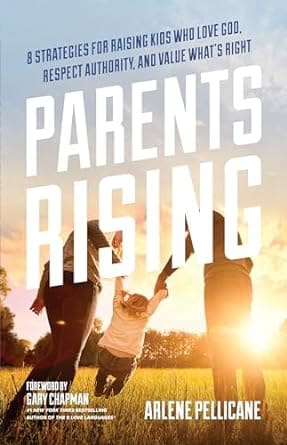
Arlene Pellicane and Parents Rising (Part 2)
 John Farrell: Of the eight strategies that you discuss in your book, Parents Rising, which one is the most important and which one do you think is the one people most struggle with?
John Farrell: Of the eight strategies that you discuss in your book, Parents Rising, which one is the most important and which one do you think is the one people most struggle with?
Arlene Pellicane: I’m going to go with the first and the last strategy. The first strategy is “Amusement Is Not the Highest Priority.” The reason I think this one is extremely important is because we’re so saturated with technology and because it’s still acceptable for an 18-month-old or five-year-old or 10-year-old to be holding their iPad and doing something. And we, as parents, think, “It’s educational” or “It’s cute” or “It’s just the way childhood is now.”
We think these things, but we don’t realize that Steve Jobs — who arguably would know a lot about the iPad — when Nick Bolton, the reporter, came to his house and casually asked, “How are your kids enjoying that iPad?” Jobs said, “I don’t let them use the iPad.”
For us, as parents to realize there’s a reason why people in the tech industry limited those devices to their kids because they’re 1: very addictive, like a slot machine of what can I see next? Two, it’s just so easy to get a reward and a payoff. Why should I go outside and rake leaves or even go outside and learn how to shoot a basketball, when I can just press this button and get all these accolades? It just makes life so easy and then the regular stuff of life pales in comparison and that’s just a dangerous place to be. I think that just that knowledge of this device being very addictive and very portable.
We could talk about, “Well, what about TV? What did TV do to kids?” Well, no one’s dragging around their flat screen. The fact that these devices are so portable. They go in your pocket. They go anywhere and everywhere. For the parent, they feel like, “This is so nice because I can be anywhere and now my child will behave because they have this device.” But you have to realize that the downside is what happens when I take that device away? And that’s a good test for you as a parent. If you took all devices away for one day, if your child is completely fine, they don’t even ask for the device once and life goes on as normal, then you know this is not taking over. But if you take away the devices and by eight o’clock in the morning they’re asking, “Where’s my iPad? Where’s my game? Can I see your phone?” Then you’ve got to have those warning signs that say, “Wait a minute, my child is way too into this.” I think “Amusement Is Not Highest Priority” and the infiltration of devices in the home is super important because if you lose that battle then your children tune you out because they’re too busy on their devices to listen to you.
The other strategy that came to mind was the last one, “Launching Adults, Not Babying Children.” It’s just the idea for us, as parents, to realize that someday this kid’s going to be an adult so I should really teach this kid some skills so they can adult well. I think we’re more nurturing like, “You forgot your lunch and you’re a freshman in high school? I’ll bring it to school for you.” We’re this kind of parent, but to realize when that freshman in high school forgets their lunch, it’s okay for them to go hungry one day so they realize, “I should be more responsible and remember my lunch tomorrow” or whatever the case is.
So, this idea of preparing your kids for adulthood. If we’re raising kids to drink soda and eat chips and watch TV all day because it’s fun to be a kid, you realize by the time they’re 20 or 30 this whole diet thing is really going to catch up with them and their boss is really not going to appreciate that every spare moment they’re watching YouTube videos while they’re on the job. Then you realize, I’ve got to make some changes so when they’re an adult they will be more successful.
JF: Throughout the book you talk about intentional parenting. Why is intentional parenting critical?
Arlene: I think it’s a little bit like that chocolate chip cookie thing I was telling you about. If you aim for nothing, you’re going to hit it with great accuracy. I think we have this wrong narrative that it’s alright for your child to follow their heart. Don’t pressure a child. Let your child discover what’s good for them. And the idea of parents to not foist your values onto your child and all these kinds of nice sentiments we put on t-shirts and products for us to realize that this is intentional parenting.
This is Deuteronomy parenting that you love the Lord your God and that you teach your children about the Lord’s commandments. You teach him that if you obey God, you will be blessed and if you disobey God, you will be cursed. That we remember what God has done for us. We recall his great miracles. This is intentional parenting. How do I pass on my faith to this child? How can I teach this child? How can I love and meet this child’s needs?
It’s really important to not buy this, “Just let them blossom on their own,” because we all have a sin nature so when we blossom on our own, we usually blossom the wrong way. You would never send your child on a bus and say, “Okay, good luck buddy.” You’re going to send them to a destination. You’re going to say, “We’re putting you on the bus and grandma is going to be on the other side of it. It’s only a one-hour ride and so and so’s going to look after you.” There is a destination. In intentional parenting, there is this destination for your child to know the living God, for your child out of their own heart to make that decision to serve God, and you’re doing your best to help that child reach that outcome.
JF: You talked a little bit about technology and some of the disadvantages of having technology. What can the parents do to improve the use of technology at home to make it more effective during times that it is being used?
Arlene: Let’s think about geography. The place that the technology is so that the technology has a place. Either a physical place where we’ll use devices, but that can be in the family room and the living room and the open spaces. Something you may want to consider is not having devices in the bedrooms because once they go in the bedrooms they tend to stay in the bedrooms and now they mess up sleep habits. In the middle of the night no one’s texting your teenage son, “Hey, you want to go to Bible study?” No one is doing that. So, I think the geography of where are the devices is a good question to ask.
Then in the day, when is it appropriate to use devices? For instance, anytime that the family is gathered around the table that’s a time that all the devices are away. Maybe one hour before bed time we start powering down everything — adults included — so that we can have more sleep and we’re able to have good sleep. So, be thinking about the pockets of your day and what are the screen-free rooms and what are the screen-free times so that you’re putting your technology in a certain place.
Then when you do have the technology, let’s say, the time between the time the kids come home from school and dinner, that’s a time for the kids to use technology, to finish up their homework and then that’s up to you. After they’re done with their homework, can they still use it? That’s up to you. You can talk about that, but then you might say after dinner, “We are all going to watch a half-an-hour program together.” Because watching together is very different than everyone just segmented watching alone. When the family is all around the TV watching, that’s fun and it’s a shared experience. It’s something that you do together. But typically, how technology is used is dad’s watching one thing, mom’s watching another thing, someone’s got their earbuds in, someone’s on YouTube, and someone’s playing a video game. It’s very individual. When it’s done together, that’s different and that’s better.
Then the last thing I would say of the actual content, is a question to ask, “Is my child consuming something or is my child creating something?” It’s a lot different to watch YouTube videos all day of just this silly, goofy stuff or if your child is learning. My one daughter, she wants to learn how to braid hair. She’s 10, so she’ll say, “Mom, can I watch this YouTube video on braiding hair?” And I’ll say, “Sure you can watch that.” She watches it and she’ll braid her sister’s hair while she’s watching. She is learning how to do something and that is different than simply consuming.
Ask yourself are they creating something or are they consuming? And then if they are consuming, is it junk food or is it healthy food? Because it’s okay to have some junk food. I’m not saying that you can’t ever watch a funny video. Of course you can, but it can’t be all the time. Then it’s just like a steady junk food diet. Once in a while, you watch those funny videos, but then the other time it’s more like digital vegetables, which would be more of the reason why parents get the devices, with the intention of learning another language or to Skype grandma, but it’s not what they’re really doing. Those are the good things that can be done.
Have your devices. Have certain places in your home that are good and certain places where they’re restricted. Certain times of the day where it’s a no-screen zone, but other times where it’s okay. Then when it’s time to watch, ask yourself are you creating something or are you consuming? Is this digital candy or digital vegetables? Digital candy for a little bit is fine, but too much candy makes us all sick and it’s the same thing.
…
Order your copy of Parents Rising: 8 Strategies for Raising Kids Who Love God, Respect Authority, and Value What’s Right by Arlene Pellicane
Trending Now
Sign up today for your Inspiration Today Daily Newsletter
Supercharge your faith and ignite your spirit. Find hope in God’s word. Receive your Inspiration Today newsletter now!
John Farrell
John Farrell serves as the Digital Content Manager at Inspiration Ministries, where he oversees the planning, organization, and management of website content to support the ministry's global digital outreach. With a strong background in writing and editorial strategy, John ensures that the articles, devotionals, and discipleship resources on Inspiration.org are accurate, engaging, and aligned with the ministry's mission.
John has authored more than 1,000 articles, press releases, and features for Inspiration Ministries, NASCAR, Lionel, and Speed Digital. His versatility as a writer is also showcased in his 2012 book, The Official NASCAR Trivia Book: With 1,001 Facts and Questions to Test Your Racing Knowledge.
A graduate of Appalachian State University, John brings excellence and attention to detail to the digital experience at Inspiration Ministries. He lives in Concord, N.C., with his wife and two sons.
Related Articles
February 13, 2026
How to Find Joy in the Midst of Sorrow
Sorrow has a way of arriving uninvited—and staying longer than we expect. Loss reshapes our lives,…
January 30, 2026
What’s Happening to Your Family?
Families around the world are facing challenges that feel heavy, confusing, and unfamiliar. This…
January 14, 2026
How to Build a Stronger Marriage
When the same arguments keep resurfacing and distance quietly grows, it’s easy to feel stuck. If…
August 23, 2025
If God Is a Loving God, Why Is There So Much Pain in This Life?
Why is there so much pain in this life? This heartfelt article wrestles with that question through…
Next Steps To Strengthen Your Walk
Inspiration Today Newsletter
Supercharge your faith and ignite your spirit. Find hope in God’s word. Receive your Inspiration Today newsletter now!
Christian Articles
Find articles to strengthen your walk and grow your faith. We have a wide range of topics and authors for you.
Submit A Prayer Request
We are here for you. Simply click on the button below to reach us by form, email or phone. Together we will lift our hearts and voices with you in prayer.





